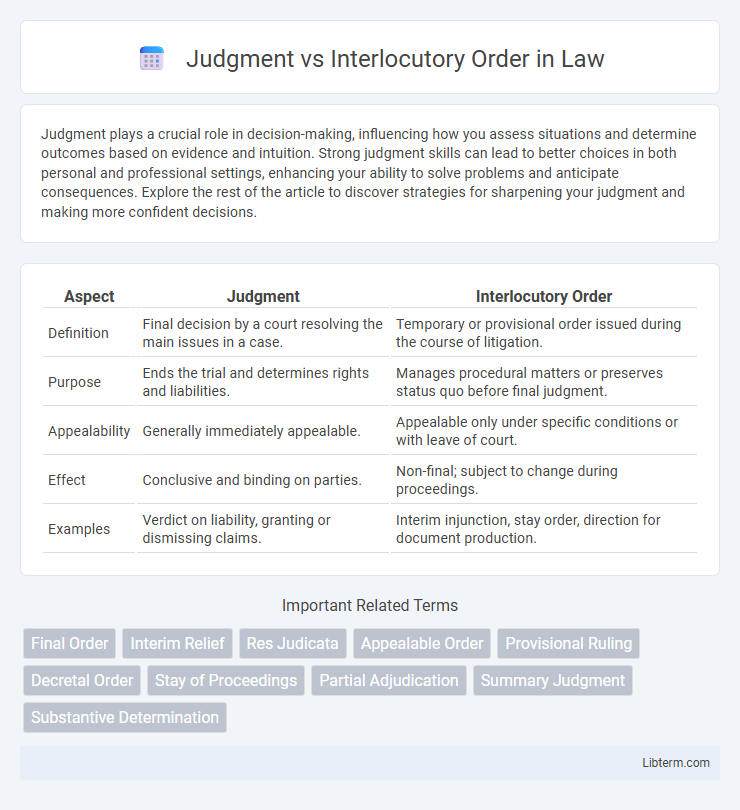Judgment plays a crucial role in decision-making, influencing how you assess situations and determine outcomes based on evidence and intuition. Strong judgment skills can lead to better choices in both personal and professional settings, enhancing your ability to solve problems and anticipate consequences. Explore the rest of the article to discover strategies for sharpening your judgment and making more confident decisions.
Table of Comparison
| Aspect | Judgment | Interlocutory Order |
|---|---|---|
| Definition | Final decision by a court resolving the main issues in a case. | Temporary or provisional order issued during the course of litigation. |
| Purpose | Ends the trial and determines rights and liabilities. | Manages procedural matters or preserves status quo before final judgment. |
| Appealability | Generally immediately appealable. | Appealable only under specific conditions or with leave of court. |
| Effect | Conclusive and binding on parties. | Non-final; subject to change during proceedings. |
| Examples | Verdict on liability, granting or dismissing claims. | Interim injunction, stay order, direction for document production. |
Definition of Judgment
A judgment is a final decision rendered by a court that conclusively determines the rights and obligations of the parties involved in a legal dispute, effectively ending the litigation on the merits. It resolves the core issues presented in the case, providing a definitive outcome that can be enforced or appealed. Unlike interlocutory orders, which address preliminary or procedural matters without deciding the main controversy, judgments establish the definitive legal status between the parties.
Definition of Interlocutory Order
An interlocutory order is a temporary or provisional court ruling issued during the course of litigation that does not finally determine the rights of the parties involved. It addresses procedural matters or intermediate issues, such as motions for injunctions or discovery disputes, and remains effective until the final judgment is rendered. Unlike a judgment, an interlocutory order is not immediately appealable unless it falls under specific exceptions defined by law.
Key Differences Between Judgment and Interlocutory Order
Judgment is a final decision by the court that conclusively resolves the entire dispute between the parties, determining their rights and liabilities, whereas an interlocutory order is a temporary or provisional ruling made during the course of litigation to address specific issues without finally deciding the case. A judgment typically ends the trial and is appealable, while interlocutory orders are often non-final and may only be challenged through special leave or at the conclusion of the case. The legal impact of a judgment is binding and enforceable as a decree, whereas interlocutory orders guide the procedural conduct and interim matters within the ongoing lawsuit.
Legal Significance of a Judgment
A judgment represents the final decision of a court that conclusively determines the rights and liabilities of the parties in a legal dispute, thereby bringing the case to its closure. It carries binding legal authority and is enforceable as a decree, providing a definitive resolution subject to appeal within prescribed limits. In contrast, interlocutory orders, being temporary and provisional, address procedural or intermediate matters without adjudicating the substantive rights or ending the litigation.
Legal Implications of an Interlocutory Order
An interlocutory order, unlike a final judgment, addresses preliminary or procedural issues during ongoing litigation and does not conclusively resolve the entire dispute. Its legal implications include limited enforceability and restricted appealability, as courts generally allow appeals only after a final judgment is rendered to avoid piecemeal litigation. Courts possess discretionary power in issuing interlocutory orders to manage the judicial process efficiently, ensuring fairness without prematurely ending parties' substantive rights.
Appealability: Judgment vs Interlocutory Order
Judgments are final decisions by a court that resolve the main issues in a case and are generally appealable as a matter of right. Interlocutory orders address preliminary or procedural matters and are typically not immediately appealable, requiring special permission or certification for appeal. The distinction in appealability aims to balance efficient case management with the rights of parties to contest significant rulings.
Examples of Judgments in Court Proceedings
Judgments in court proceedings include final decisions such as verdicts in criminal trials, decrees in civil suits, and orders granting or denying motions for summary judgment. Examples also encompass judgments confirming arbitration awards and rulings on appeals that resolve the main issues of a case. These judgments conclusively determine the rights and liabilities of the parties involved.
Examples of Interlocutory Orders in Litigation
Interlocutory orders in litigation include temporary injunctions restraining a party from certain actions until the final judgment, orders for discovery compelling the exchange of evidence, and interim custody arrangements in family law cases. These orders address procedural or urgent matters that arise during the course of a trial, ensuring fairness and preventing irreparable harm. Unlike final judgment, interlocutory orders are not conclusive and can often be appealed only under specific circumstances.
Impact on Case Progression
A judgment conclusively resolves the key issues of a case, allowing it to progress toward finality or appeal, whereas an interlocutory order addresses provisional matters and does not conclude the entire dispute. The issuance of a judgment typically advances the case to closure or the next legal phase, while interlocutory orders often necessitate further proceedings or additional motions, potentially prolonging litigation. Understanding the distinct effects of judgments and interlocutory orders is crucial for managing case timelines and strategizing effective advocacy.
Finality and Enforcement: Judgment vs Interlocutory Order
A judgment is a final decision by the court that resolves the main issues in a case and is enforceable immediately, often leading to execution or appeal. An interlocutory order is a temporary or provisional ruling made during the course of litigation that addresses procedural or ancillary matters and generally cannot be enforced or appealed until the final judgment. The finality and enforceability distinguish judgments as conclusive outcomes, whereas interlocutory orders maintain the status quo pending further proceedings.
Judgment Infographic

 libterm.com
libterm.com